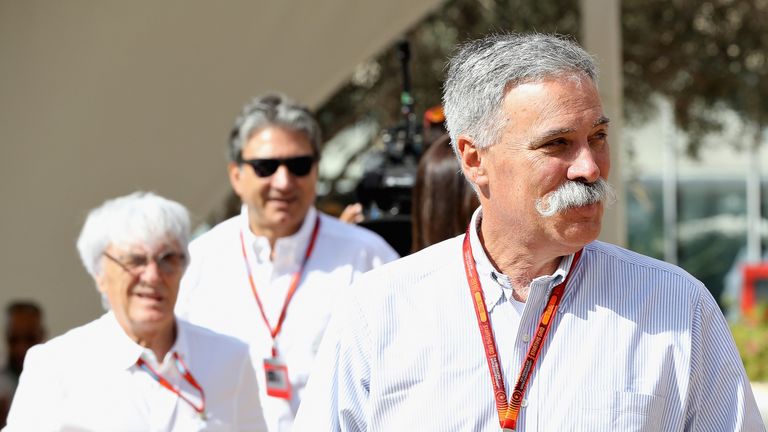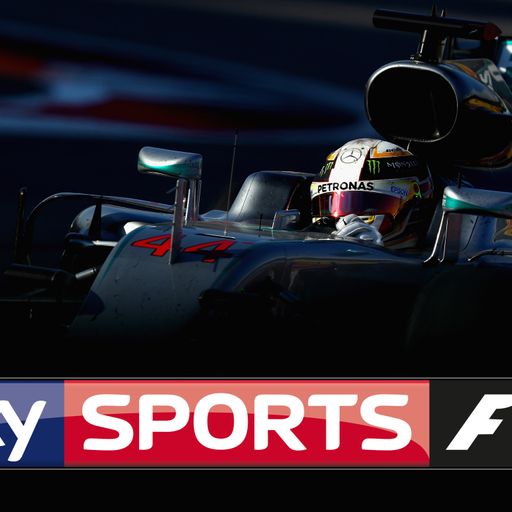Formula 1's new era: Q&A on the sport's new owners and plans
Answering the key questions as a new era in F1 begins
Wednesday 25 January 2017 15:35, UK
Formula 1 was already set for a new era on the track in 2017 before this week produced seismic changes off it too as Liberty Media formally completed its purchase of the sport's commercial rights.
With Bernie Ecclestone no longer in day-to-day control, who now does run F1, what are their plans, and when will changes start to be seen? Assessing the sport's big talking points...
Who's now in charge of F1?
The completion of Liberty Media's takeover has resulted in an immediate and far-reaching change in F1's senior management structure.
Chase Carey, previously installed as the sport's new chairman last September, assumes Bernie Ecclestone's long-held chief executive role. The American former TV executive is now in day-to-day charge of F1.
Below Carey are two managing directors: Ross Brawn and Sean Bratches. Brawn, the hugely successful former F1 team boss and technical director, will have responsibility for sporting matters while Bratches, an experienced marketing executive in American sports TV, will take over the commercial side of the business long considered Ecclestone's domain.
Why has Ecclestone been moved aside?
The end of Ecclestone's long and successful reign as F1's supremo had incorrectly been predicted in the past but it wasn't until Monday night that the 86-year-old's tenure as the sport's commercial overlord was officially ended.
A candid Ecclestone had hinted at his likely departure in an interview with Sky F1 in Brazil last November, telling Martin Brundle "probably I won't fit in" if Liberty installed a more corporate structure.
Carey: New role "difficult" for Ecclestone
Two months on and that came to pass.
In an interview with Sky Sports News HQ, Carey said: "I shared the view, as we looked at the business, particularly over the last four to five years the sport had not grown to its full potential and we needed to put a new organisation in place that was able to grow the sport in today's world in the way it needs to grow."
No longer in day-to-day control of the sport, Liberty has nonetheless recognised Ecclestone's immense contribution to the success of F1 by making him chairman emeritus.
What does Bernie's new role entail?
Although effectively now holding an honorary position, Ecclestone's advice and expertise can still be utilised according to Carey.
F1's new chief accepted it would be "difficult" for Ecclestone to come to terms with the changes but hoped to continuing tapping into the 86-year-old's knowhow.
"Hopefully we'll find a way that it continues to be rewarding for him," Carey told SSNHQ. "I want him to feel good about it. He will always be part of the Formula 1 family, he will always be welcome, and I want to try and make this something he can continue to feel part of.
"But it's a big change for him and I understand that."
It remains to be seen how Ecclestone will respond to his new role. Speaking in the interview with the German magazine in which he announced he had been replaced on Monday night, Ecclestone said: "I have this title now, even though I don't know what it means."
The former F1 chief has yet to comment since news of the changes was made official.
When will F1 start to see change?
F1 fans are understandably excited to see what the sport's new era has in store, but Liberty has made clear that short-termism is not on its agenda.
"I think the sport has not been served well in recent years by having too much of a short-term focus," Carey said. "And so when people have talked change, my real response is my focus is where are we in three or four years, not where are we in three or four months.
"That doesn't mean we won't make changes over three or four months. But many times to make changes, you've got to make investments, you've got to build foundations, so you'll see changes this year but our real goal is where can we get this sport in 2020."
Carey says he wants to "take this sport to a whole new level", with growth in F1's marketing and digital media output likely to be among his initial short to mid-term targets.
Will there be more races?
In simple terms, one way for F1 to grow its revenues is to stage more grands prix each season.
An eventual increase to 23-25 races has been mooted in recent months, although it appears that quality rather than simply sheer quantity will form a major consideration in Liberty's plans.
"We're engaged with a number of markets that we think have the potential for a race," said Carey. "We'd like to have a race that really is a major event in the US, at a destination city, so that means one of New York, Los Angeles, Miami, Las Vegas.
"A city where people would want to go for three days, four days, or a week, and have this race be the centre piece of this event like a SuperBowl is."
Brundle: F1 can reach new heights
While the United States and Asia are inevitably core markets to target, Carey has also stressed Liberty's commitment to F1's European heartland - with the continuation of a British GP set to play a part in that.
Are the teams on board?
While hailing the four-decade contribution of Ecclestone, F1's teams have enthusiastically welcomed the arrival of new owners for the sport's commercial rights.
"I think they're all on board for a change," admitted Carey, with the American speaking of constructive talks with team chiefs since becoming chairman in late September.
But can F1's new management overcome what has increasingly become one of the sport's most frustrating issues: the inability of teams to regularly agree on major changes? Sky F1's Damon Hill has likened attempts to gain F1 consensus to "herding cats".
McLaren chief Zak Brown, who had been in the running for Bratches' commercial role before opting to join the Woking team, told SSNHQ: "Chase is a tough cookie so at the end of the day someone needs to make a decision and I have no doubt he will.
"He has been very engaging with the teams, I've spent a lot of time with him. He's learning, he's listening, he's asking for ideas and I think what he'll do is get a lot of feedback and the teams will agree on a lot of items, and the teams will disagree. He'll have to take that on board and then make decisions."
For his part, Carey says he will look for ways to make F1's decision-making process more efficient: "The governance structure that has been put in place isn't working very well so we need to make decisions more effectively, more efficiently."
Commercial deals with the majority of teams hem F1's new chiefs in regarding many contentious issues, including revenue distribution, until 2020 but Carey has made clear he and his new management team are already looking beyond that and into F1 in the next decade.




